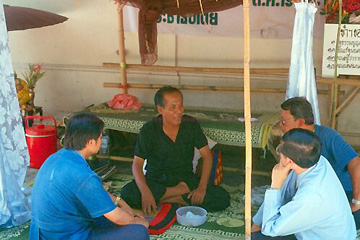 |
| Chalat, a fighter for democracy |
The broiling heat is slackening a little in late May. On knowing Chalat Worachat had begun a hunger strike outside the parliament buildings, I went along to watch him. After serving as a non-commissioned officer in the technical section of the air force, Chalat became a second lieutenant and then resigned from the military to engage in political activities. He was at one time a member of the Parliament, and is fairly well known as a ‘professional’ hunger-striker. In the 1980s he went on hunger strike three times as a political activist. In 1992 he began a hunger strike in April and became a catalyst of a big political change, called “Phrutsapha Thamin” in Thai, in the following month.
In 1994 he called for a thoroughgoing revision of the 1991 constitution. Judging from the political situation at that time, this seemed to be an utterly impossible demand. However immediately afterwards a lively debate on political reform began, and three years later a complete revision of the constitution became a reality. The present constitution, drafted and promulgated in 1997, is the fruit of the political reform.
In Thailand, political democracy took root in the 1990s. Chalat played an important role in two critical events for democratization: the change in government of May 1992 and the introduction of the new constitution in 1997. He can and should be counted as one of the heroes of democratization. However when in 2000 he stood in Bangkok as a candidate for the Senator, he suffered a crushing defeat. In the following year, he ran for general elections. However he was disqualified. In the 2000 Senator election the electorate in Bangkok must ballot twice, first on March 4, second on April 29. Under the 1997 constitution, voting is compulsory. Because Chalat neglected to vote in the second election, he was disqualified as a candidate for the general elections in the following year.
The credit for the democratic change of May 1992 was claimed by the urban middle class. The content of the 1997 constitution has an elitist element, reflecting the political interests of the class. Depreciation of substantial contributors to democratization such as Chalat may be a key element of gradual and conservative democratization in Thailand. |
 Postcards from the Field
Postcards from the Field